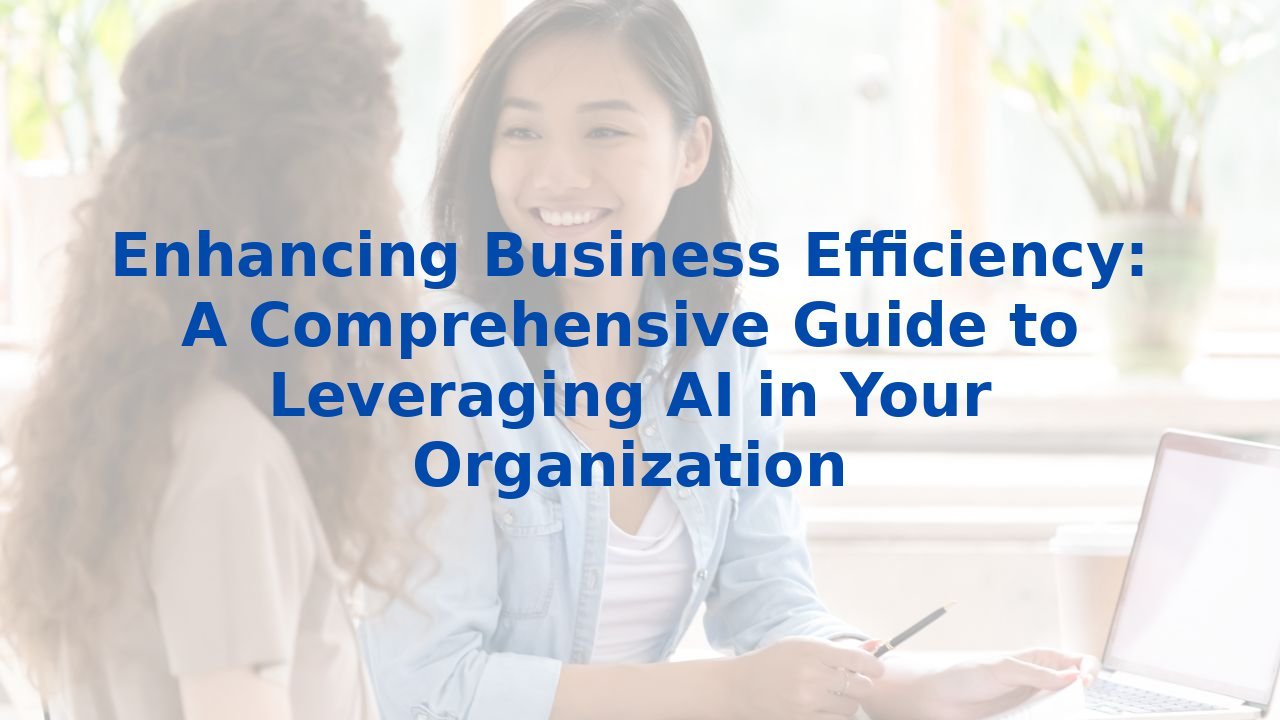Enhancing Business Efficiency: A Comprehensive Guide to Leveraging AI in Your Organization
Enhancing Business Efficiency: A Comprehensive Guide to Leveraging AI in Your Organization
In a world where change is the only constant, businesses strive for efficiency and productivity. In this pursuit, Artificial Intelligence (AI) emerges as a powerful ally. It offers transformative capabilities to streamline operations, automate processes, and enhance decision-making. This guide dives into how AI can optimally enhance business processes and detail the benefits of an AI-integrated workforce.
Understanding AI Process Optimization
AI process optimization is the heart of enhancing operational efficiency. It entails the use of advanced algorithms and machine learning to analyze data, automate repetitive tasks, and empower team members to make informed decisions. What remains at the core of this process is the goal: to minimize errors, amplify productivity, and enhance overall operational efficacy.
Enhancing Business Processes with AI
1. Process Discovery and Mapping
Consider how tedious it can be to map out business processes manually. This is where AI swoops in, utilizing techniques like process mining and pattern recognition. By uncovering existing workflows with precision, AI ensures accurate mappings that enlighten managers about the dynamics of their operations. The clarity gained from such data-driven insights allows organizations to maintain a robust understanding of their processes, revealing paths to innovation and optimization.
2. Process Automation
Automation is perhaps the most talked-about advantage of AI. Think of routine human tasks—data entry, document processing, form filling—often perceived as mundane and error-prone. Here, AI’s prowess shines brightly. Intelligent document processing, for example, can take charge of transforming heaps of paperwork into streamlined data, freeing employees for more strategic endeavors. The transition from manual to automated processes minimizes errors and accelerates project timelines.
3. Process Management and Improvement
The beauty of AI lies in its relentless monitoring capabilities. By constantly analyzing processes using historical data, AI can identify potential issues before they balloon into real problems. Predictive analytics and root cause analysis provide actionable insights, enabling continuous improvement of business processes. A forward-thinking approach inspires businesses to stay aligned with industry standards while evolving dynamically.
4. Enhanced Decision-Making
Decision-making can be complex, with myriad factors requiring consideration. AI dramatically reduces uncertainty by synthesizing information from diverse sources. By providing simulations of alternative scenarios and extracting trend patterns, AI helps decision-makers visualize outcomes. The result? Better-informed decisions that can enhance strategic planning and operational effectiveness.
Benefits of AI Integration
1. Improved Efficiency
AI doesn’t just optimize processes; it revolutionizes them. The integration of AI fosters faster outcomes and elevates quality across various business domains. The extraordinary capacity to analyze vast amounts of data uncovers inefficiencies that the human eye often overlooks, leading to a transformation in how work is done.
2. Cost Reduction
In an era of tight profit margins, cost reduction is a priority. AI’s capability to detect anomalies in business processes allows organizations to act swiftly and mitigate risks before they escalate into more significant issues. Automation not only saves time but also translates directly into cost savings—every second counts when the goal is to enhance the bottom line.
3. Enhanced Customer Experience
Customer experience is everything in today’s market. AI empowers customer service teams with tools that can analyze feedback and field basic inquiries seamlessly via chatbots. AI-driven responsiveness creates smoother interactions with clients, allowing organizations to proactively address concerns and ultimately improve satisfaction and loyalty.
The Role of Employee Training in AI Integration
AI is undeniably powerful, but its effectiveness hinges on skilled personnel. Training employees to understand and leverage AI technology is crucial. This involves not just learning how to operate AI tools but also interpreting the insights they generate. For example, when HR teams are trained in AI applications, they gain the ability to analyze data for fairer salary negotiations, fostering transparency and objectivity in the workplace.
Conclusion
AI stands as a game-changing force in enhancing business processes. Its ability to automate tasks, support data-driven decision-making, and improve operational workflows propels organizations toward greater efficiency and cost-effectiveness. However, the journey does not end with deploying AI; comprehensive training for employees will unlock its full potential. By marrying technology with talent, businesses can not only navigate the complexities of today’s market but also thrive for years to come. Discover how your organization can evolve through AI by exploring complete training solutions tailored for diverse workforce needs.



